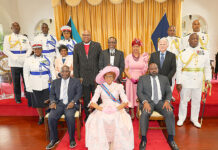Minister of National Security and Immigration the Hon. Tommy Turnquest gives his contribution to debate on the formation of a House Select Committee on Crime on Wednesday, February 13, 2008. (Photo/Peter Ramsay)
By: Matt Maura
NASSAU, Bahamas – Poor parenting, a breakdown in morals and values, poverty and illiteracy and the urgent need for improvement in the criminal justice system were reasons given for the rise in crime and criminality during the recently concluded National Youth Anti-Crime and Non-Violence Forum, Minister of National Security, the Hon. Tommy Turnquest told Parliament Wednesday.
The National Youth Anti-Crime and Non-Violence Forum was held Friday, February 8, at the Paul H. Farquharson Conference Centre, Police Headquarters, and was attended by more than 200 young people from throughout the Commonwealth of The Bahamas. The Forum was hosted by the Conference of Youth Leaders (COYL) and the College of The Bahamas, and sponsored by the Ministry of National Security.
Young people, representing a cross-section of Bahamian society, were given the opportunity to express their reasons for the increase in crime and criminality in The Bahamas, while offering their solutions and recommendations for improving the current trends.
Organizers of the Forum said it was particularly important to get the views and recommendations of the youth of the nation as it is predominantly the young people in the country – particularly young males – who are either committing some of the more violent crimes being recorded, or are the victims of those crimes.
Minister Turnquest said the nation’s youth stressed the need to address issues such as domestic violence and other social ills, the removal of any existing loopholes in the criminal justice system and the need for all citizens of The Bahamas to obey the rules of the land, as part of the process aimed at reducing crime and criminality in The Bahamas.
He noted that recommendations coming out of the Forum included the desire to “urgently examine” the psychological and other factors motivating criminal behaviour among the nation’s youth, the establishment of national mentoring programmes and the need for the expansion of the Urban Renewal Programme.
“Their reasoning touched a broad spectrum of issues from personal to institutional, from community to governance,” Mr. Turnquest said. “They spoke openly and passionately about issues such as poor parenting and the distortion in values and principles in our country, particularly among our young people.
“These were young people concerned that as the next generation of Bahamians and Bahamian leaders, they should not have to grow up in an environment of crime and violence,” Mr. Turnquest added.
Mr. Turnquest said among other recommendations put forth, was the need to sustain and widen the dialogue among young people on crime and criminality and to provide spaces for positive interaction between young people, especially in the area of wholesome entertainment.
The Forum’s youth further recommended that laws, particularly the “minor” ones such as traffic and other violations, be vigorously enforced and that a determination should be made on the question of Capital Punishment.
They also asked to “be at the table” when the discussions and decisions are being made on crime and criminality and in seeking solutions to these problems.
“They want to be listened to and not talked to,” Mr. Turnquest said.
Mr. Turnquest said “self-evident proof” that the young people’s assessment of the problems of crime and criminality in the country was “spot on” came just three days following the conclusion of the forum when a young man was stabbed on the campus of the C.C. Sweeting Senior High School.
“It was almost as if the perpetrator had no consciousness of the fact that he was ending the life of another, a life that could never be brought back again,” Mr. Turnquest said. “No value was given to the sanctity of life. There was no question of morals, of what was right and what was wrong. There seemed to be no care for the consequences of that action.”
The Minister of National Security said it was clear from the recommendations and suggestions provided by the youth attending the Forum and from the views they expressed on crime and criminality that it took some time for them to “come to the state of consciousness they showed about what is happening in our country.”
Mr. Turnquest applauded the efforts of all of the young people who attended the Forum, while paying special tribute to the young persons who organized it. They were Anastarcia Huyler, Adril Aranha, Delvano McIntosh, Sacha Armbrister and the Petit Brothers, Bernard and Jackson.
They were guided in this initiative by Dr. Vicente Roberts, Director of Campus Life at COB.
“They are proof that there are far more good young people in our country than those committed to crime and criminal behaviour,” Mr. Turnquest said. “We have heard our young people and will give expression to their recommendations.”








